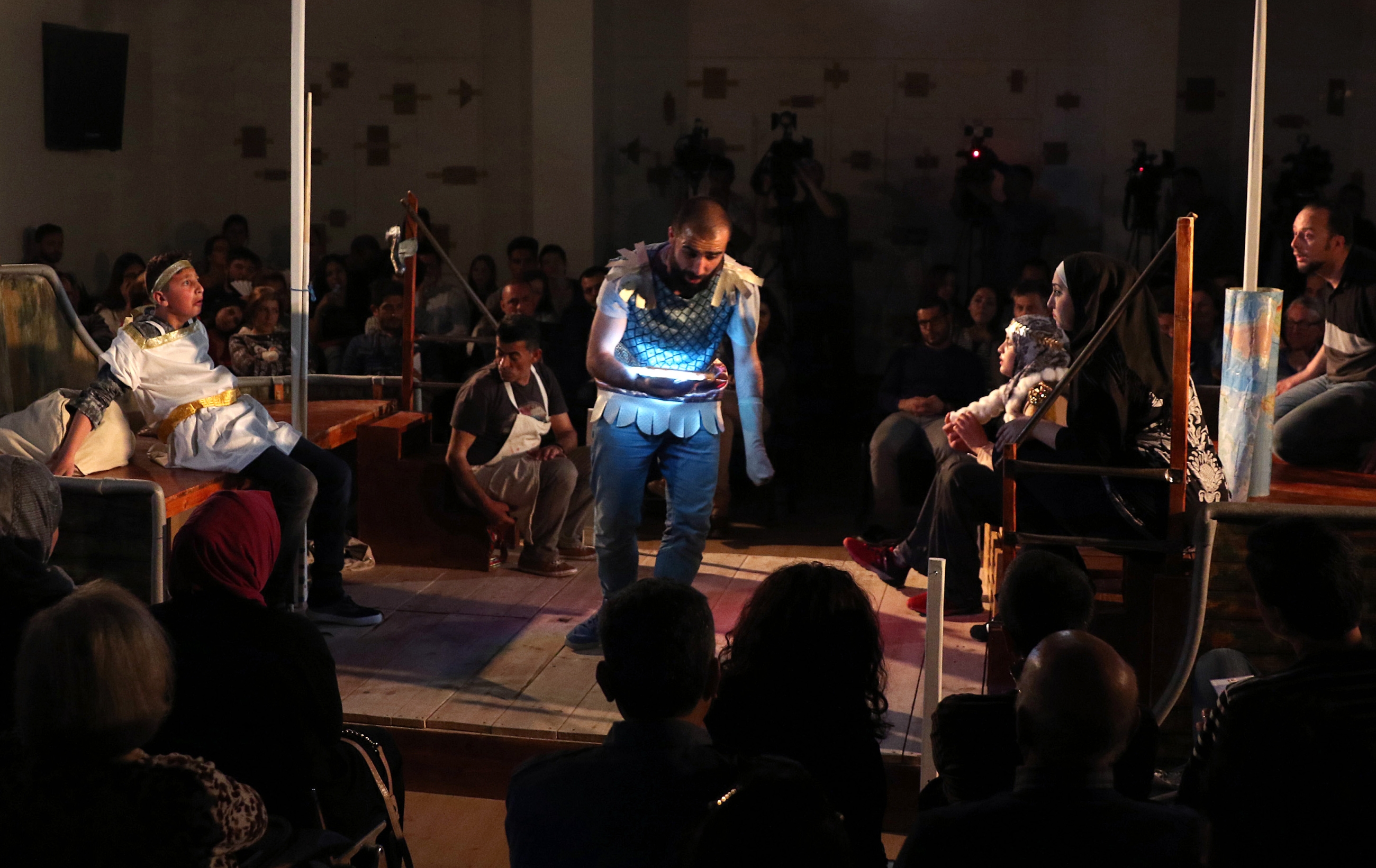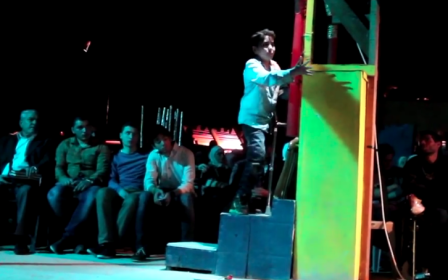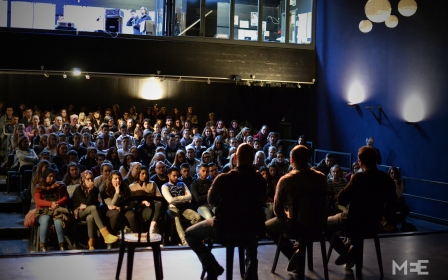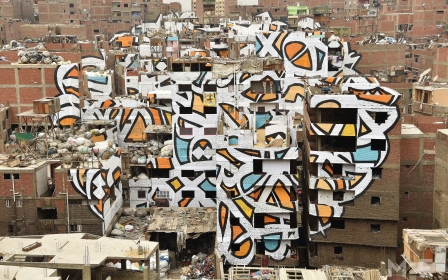Exiled Syrian actor's new play takes on the politics of war

AMMAN – An amateur theatre production recently staged in Amman has taken aim at the taboo trifecta – sex, politics and religion – and shone a spotlight on the increasingly conservative zeitgeist across much of the Arab world.
Love Boat is the boisterous, darkly comic story of six Syrian actors on a journey across the Mediterranean Sea in hopes of receiving asylum in Europe. As each new country appears on the horizon, the actors perform a scene of classic theatre: Greece begets Aristophanes’ satire The Nights, and from Spain, Miguel de Cervantes’ Don Quixote.
The crowdsource-funded production marks a shift for Syrian director Nawar Bulbul, who led children in an adaptation of King Lear at Jordan’s Za’atari refugee camp in 2014, and in 2015 used Skype to connect teenagers in Homs and Amman for a wartime riff on Romeo and Juliet. A year on, with Syria more fragmented, Europe’s borders closed and tolerance ebbing across the globe, Bulbul has eschewed round-cheeked children lisping Shakespeare for a more pointed warning about the dangers of closed borders and closed minds.
Love Boat throws classical comedy at a modern tragedy and it takes a dig at the stereotype that Syrians are uninformed people ignorant of other cultures and ideas: this cast knows classical European theatre better than many Europeans. But its sharpest dig is at the rising tide of conservatism Bulbul believes threatens to drag the region, and its people, backwards.
“If you want to make a revolution against the regime – any regime – you must make a revolution against society, traditions and religion,” said Bulbul.
“I’m trying to break all the taboos – sex, religion, politics. With Tartuffe, I’m talking about all the dictators. I’m asking people to think, who makes dictators – is it people, God or are dictators born? Why, in Don Quixote, do we show the scene of prisoners, whose sins are making music and being a lover? Because sometimes in the Arab world, this is haram, a sin,” he said.
The most powerful punch comes in a scene from Mouliere’s Tartuffe where 26-year-old Hayah Matar, playing Elmire, exposes Reverend Tartuffe as a lecherous fraud. As Tartuffe doggedly paws at Matar’s Elmire, the actress switches mid-stream from Mouliere’s story to her own script of wartime horror:
“I beg you, I am married, don’t touch me, I am like your sister. My God, 227 days in detention. They hit me, they tortured me, they didn’t spare me anything. 227 times the shabihas raped me, and when I got out of there, your ugly, dirty, wretched, f***ing society raped me a thousand times. I spit on you…"
"My rape is the rape of all Syrian women and an indelible stain on your revolution.”
The scene lands like a punch in the stomach. In Jordan, as in Syria and other conservative cultures where honour and shame are paramount, sexual violence is rarely discussed. It is also frowned upon for women to swear. For first-time actress Matar, the scene was harrowing – so much so that she was still struggling with it well into rehearsals. But by the end of the play’s run, something in her had changed.
“I have become stronger. And I have more faith that a female, particularly a veiled woman, is up to the challenge of relaying her message in a civilized and cultured manner,” she said.
This is a message director Bulbul is hoping will spread. After one performance, he referred to two women he had been surprised to see in the audience. They were from rural Syria and wore the full-face veil (niqab). Sitting in close quarters, in mixed-company, with strangers in a dark room, watching a play with swearing and sexual violence – this does not raise eyebrows in a liberal context, but in a conservative culture it does.
“Hayah’s scene is for these people,” said Bulbul. He spent four months writing the play, adapting and knitting together snatches of classical theatre around a modern story of exile and the search for refuge and – for those fortunate enough to find refuge – acceptance.
The play’s message is not just for conservative Muslims: the odious Reverend Tartuffe is deliberately styled somewhere between an Orthodox priest and Abu Bakr al-Baghdadi, the self-styled "caliph" of the so called Islamic State (IS).
“There are bad men in all religions,” said 24-year-old Mohammad Kabbor, playing Truffaldino in Carlo Goldoni’s The Servant of Two Masters.
For Kabbor, wistful about more integrated, tolerant times in pre-war Damascus, the message resonates. “We need to be more tolerant and less conservative. It’s very important to know how to live with different kinds of people.”
As sectarian suspicion and violence have risen across the region, particularly in Syria and Iraq, Jordan remains something of a model for religious co-existence: although the Sunni-majority country’s Christian population is small – around 3 percent – it is well-integrated and both culturally and economically strong. But the cultural fabric of day to day life and the social mores that frame it appear to be shifting.
“According to my experience, yes, people are becoming more conservative in Jordan,” said Manar Rachwani, an editor and columnist at Jordan’s al-Ghad newspaper.
“There’s a perspective in the West that in Jordan we think about the government and the mukhabarat [security services], but actually we consider social and religious sensitivities more,” he said.
Rachwani recalled an incident in 2005 or 2006 with an article about a Christian event. The copy featured the line "the son of God" and the article stirred up the ire of a Muslim reader who called in to complain that God had no son. At the time, Rachwani brushed the complaint off.
“Now, I would never run an article with such a phrase,” said Rachwani.
Anja Wehler-Schoeck, Amman director of the pro-democracy foundation Friedrich-Ebert-Stiftung, has tracked social and cultural shifts in Jordan, looking particularly at women’s rights and the political influence of the Salafist movement. She cited the example of women’s dress becoming more conservative over the past few decades as one visible dimension of the shift.
"Jordan has become more socially conservative over the past few decades. Search for identity is a factor, but we need to consider the influence that conservative Islamist actors have had through various channels,” Wehler-Schoeck said.
That influence is increasingly evident across the region, even if it is not fully understood. Some critics draw a connection between Saudi-style Wahhabist doctrine and the zero-tolerance violent militantism of IS, claiming the former’s deeply conservative world, and intolerant worldview has fed the latter. Others hold the two apart, and point to IS as a deviation from even the most conservative interpretation of Islam.
There is also a broader view: that intolerance may be rising across the globe. The other side of the hissing and shaming of women on streets in the Arab world is the Islamophobia rising in the West. For Turkey, Lebanon and Jordan’s closed borders, there are Macedonia’s, Croatia’s and Hungary’s. This, suggests Love Boat, leads but one way: to Faust, and a pact with the devil.
For Bulbul and his all Syrian cast, the play’s meta-story of a search for refuge and acceptance is their own. It is also ongoing. But despite this, they believe the die is not cast yet for an unending war and an irrevocable march towards intolerance. The proof, said Bulbul, is in the first few words of the play. In setting the scene, the narrator stops himself and does his own little re-set: “Let’s begin again.”
New MEE newsletter: Jerusalem Dispatch
Sign up to get the latest insights and analysis on Israel-Palestine, alongside Turkey Unpacked and other MEE newsletters
Middle East Eye delivers independent and unrivalled coverage and analysis of the Middle East, North Africa and beyond. To learn more about republishing this content and the associated fees, please fill out this form. More about MEE can be found here.




